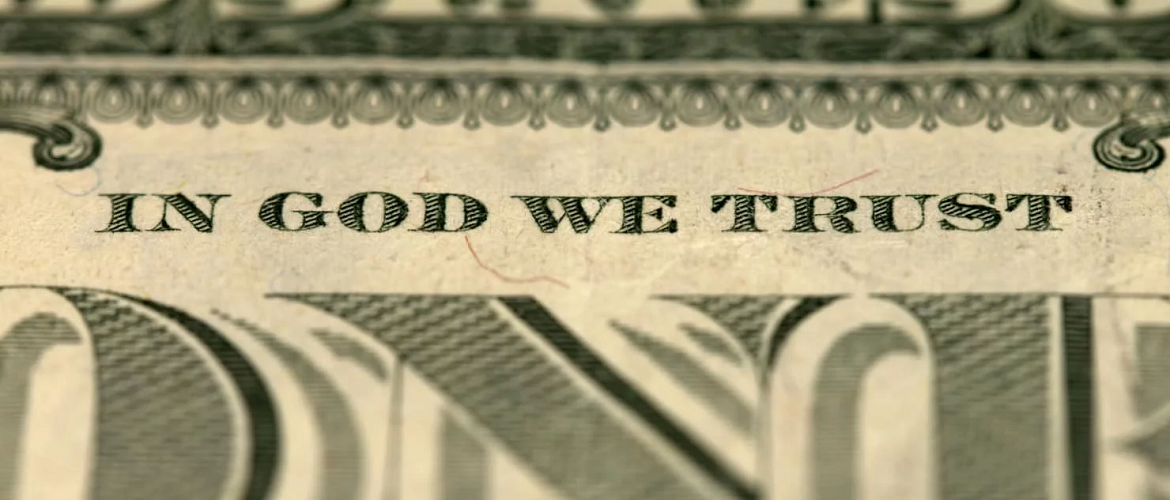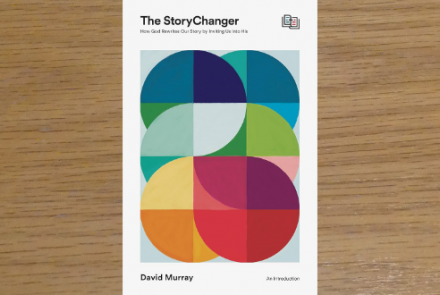In God We Trust
What is trust?
“In God we trust” - that motto is on every banknote and coin in the USA. Ironic perhaps in a country where so many have put their hope in material wealth. Nevertheless, to trust in God is a wonderful thing. If we call ourselves Christians, does that automatically mean we trust in God? Sadly, the Bible is full of people who claimed to follow God but whose lives showed that their hearts really trusted in false gods, their own abilities or in powerful people.
For the Christian who is called to make a significant sacrifice in this life, such as staying celibate because of enduring same-sex attractions, this challenge can reveal where the person's trust really lies. Do we trust that God knows best even when He denies us what we desire?
The Oxford Dictionary defines trust as the “firm belief in the reliability, truth, ability, or strength of someone or something”.
Trust in God surely means trust in God’s reliability (He will follow through on His promises), His truth (He really exists; He really is good and wants the best for His people) and His ability and strength (He is in charge of all things; He can overcome every obstacle).
If we doubt God’s reliability or His ability, then we will make contingency plans in case he doesn’t deliver and we will invest mainly in the here and now. If we doubt God’s existence, then we will probably live our lives as if He’s not there at all. If we doubt His goodness, then we will tend to rely more on ourselves or on others whose character we trust more.
Trust versus faith
Is there a difference between trust and faith? Well, faith is something we have, whereas trust can either be something we have or something that we exercise. If we have faith in God, we believe in who He is and in His ability to do great things. If we go further and exercise that faith, then we trust Him to deliver on His promises in our lives. An example of faith would be believing that a stage magician can saw his accomplice in half without harm. But trust would go further. Trust would be volunteering to be the person who gets sawn in two! Hebrews 11 is full of references to godly men and women who had enough faith to trust God in their lives.
Faith and trust feed one another: we need enough faith to stir us into stepping out of the boat in the first place (Matt 14:22-33). And then when we trust Jesus enough to step out, it builds our faith for the future.
I remember doing a team exercise with a group of men to develop trust in one another. I agreed to be blindfolded and then stood up on a chair. I could hear moving around behind me as the others arranged themselves for the exercise. Once the shuffling had stopped, the facilitator assured me that they were going to catch me. All I had to do was allow myself to fall backwards, and the group of 8 men would be there to save me from hitting the floor. I had to trust that they were strong enough, coordinated enough and willing to catch me! Despite wearing a blindfold, I felt the urge to look around and double check that everything was ok. I really wasn’t used to surrendering my wellbeing to a group of strangers. When I eventually let myself fall, there were plenty of arms to catch me and it was good to be supported: I’m sure it would have been easier if I’d done it a second time. This exercise taught me that trust is only real when it is put into practice. There is little substance to trust that never gets tested.
So do you have faith in God? If yes, that’s great. But let’s not leave it there. Let’s exercise our faith daily by trusting in God (Luke 9:23), and so build up our faith in our God who is good, powerful and reliable.
How can we trust God more?
You might be asking, “Well, that sounds fine, but how do I put that into practice?”
Well, firstly, structure your life so that you can see God working through your circumstances. If you have insured yourself against every eventuality, planned for every contingency and essentially walled yourself off against any risk (which of course you can’t - see the Parable of the Rich Fool in Luke 12!), how are you going to build trust in God? I’m not saying insurance or planning is bad, but maybe think about how you can increasingly open your life to dependence on God.
Secondly, we sometimes need to close our ears to the noise around us. Have you ever tried to have a meaningful conversation with a friend in a noisy pub? Your ears might pick up interesting snippets from other nearby conversations; your eyes might get distracted by people playing pool; your skin might feel the cold draught as new people enter the building. One way to focus on your friend in such an environment is to lean closer, turn away from distractions and tune your senses in to ignore anything else. Even better, take your friend outside away from the noise!
It works the same way with listening to God’s voice. God speaks to us through His Word (2 Tim 3:16), through circumstances (eg Gideon’s fleece in Judges 6), through the advice of fellow believers (Proverbs 12:15) and sometimes directly through a “gentle whisper” within (1 Kings 19:12 - NIV). So we need to turn from the loud voices of our world and cultivate an attentiveness towards God. Would Noah have been able to persevere with building the ark if he had been swayed by the prevailing culture around him and listened to every comment on his boat building project? How much time do we spend listening to God versus the time we spend listening to the world (eg 24/7 news, secular music, TV box sets, social media and gossip)? No wonder we struggle to trust in God if we fill ourselves with the world’s values and then just sprinkle on top the occasional 5-minute Bible reading or church service!
Finally, think of trust like a muscle. If you trust someone’s promise and that person delivers, your trust grows in his/her character and ability. The young child who allows her father to throw her up into the air builds her trust in him every time he catches her.
So we can learn to trust God more by opening ourselves more and more to His leading and by taking risks in our walk with Him. As we experience His goodness in our lives, our appetite for trusting Him will grow and then our lives will increasingly show that “In God we trust”.






